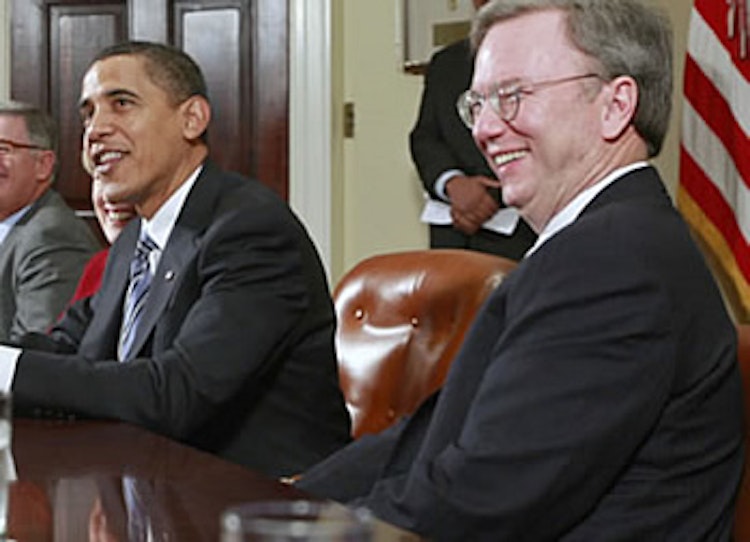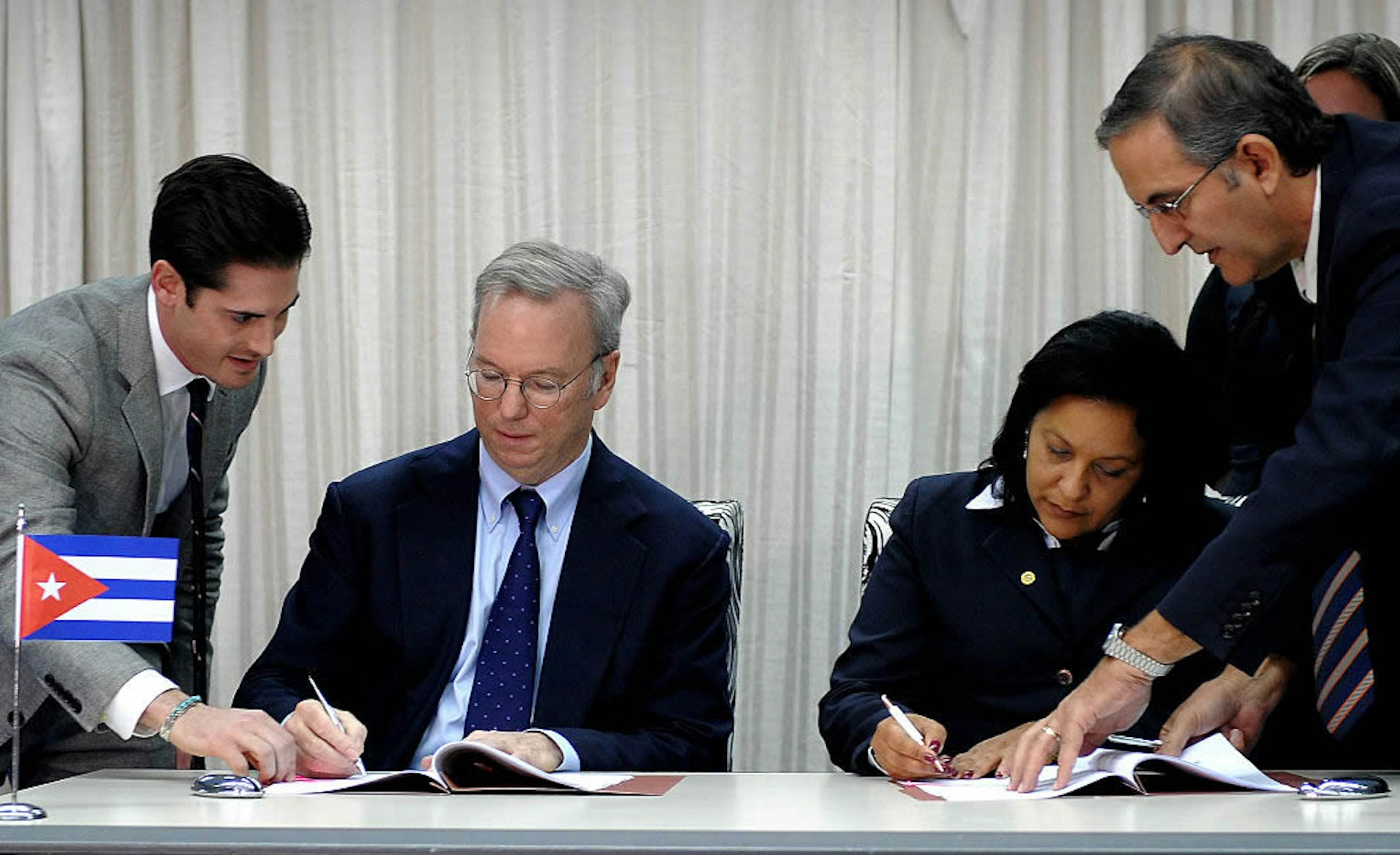Google has involved itself in some of the thorniest U.S. foreign policy issues. Is it conducting backchannel diplomacy on behalf of the United States, or for its own business interests?
Click here to download the full report »
When Eric Schmidt flew to Cuba on his private jet in 2014 with three other Google executives, company lawyers told the U.S. government it was strictly for academic research purposes.1 Newly unearthed documents suggest they may have stretched the truth.
According to documents obtained under open-records requests, Google’s lawyers assured Treasury officials charged with enforcing the U.S. embargo there was “no commercial purpose for this travel, and Google has no plans to conduct any business activities while in Cuba.”2 “The research is non-commercial and academic in nature,” Google’s application stated.3
Instead, the four Google executives—whom they referred to in their application as researchers—merely wished to conduct academic research in Cuba on how to “promote positive social change via the internet,” the lawyers wrote.4 Using soaring rhetoric, Google told the U.S. Treasury office that administers sanctions that it wished to travel to Cuba to understand its “autocratic and ghastly approach to free speech, and to map out a way to dismantle it.”5
“Google asks these questions not because Google has commercial interest in any of the answers, but because they are the most important questions to ask of an autocratic regime, and because Google is among the few institutions in the world equipped to ask them,” its lawyers wrote. “None of these goals have any commercial value, but they have massive implications.”6
Once they arrived on the island, however, the Google executives embarked on a packed agenda of meetings with officials that act as gatekeepers to the Cuban internet, including from Cuba’s state telecom body, the state internet service provider, and the government body that runs public internet “cafes,” according to a detailed schedule for the trip.
Those contacts opened the door to a series of historic business deals between Google and Cuba, which had been inaccessible to U.S. companies for more than half a century.8 Less than two months after their return, Google announced that its web browser, Chrome, would be available in Cuba for the first time.9 A few months later, Google further expanded its product offering in Cuba, making available its Google Play app store and Google Analytics user-tracking software for Cuban websites.10
The frenzy of deal-making has continued to the present day. In December 2016, in the closing days of the Obama administration, Schmidt was back in Havana, signing a deal to place servers on the island to ensure faster delivery of Google content.11 In 2018, Google signed four memoranda of understanding with Cuba, “to promote Cuban content.”12
Google’s early trip to Cuba—made ostensibly for academic research purposes—turned out to have broad commercial implications for the company
The string of deals has apparently culminated in an agreement to wire-up the island with internet hotspots and connect it to the mainland via one, perhaps two undersea cables.13 On March 28, 2019, Cuba and Google signed a “peering agreement” to connect their networks through a new, physical link.14
Google’s early trip to Cuba—made ostensibly for academic research purposes—turned out to have broad commercial implications for the company, putting it in pole position to connect one of the largest remaining virgin markets in the hemisphere.
Schmidt’s unusual visit to Cuba also presaged an unexpected and major shift in U.S. policy toward Cuba. In December 2014, six months after the trip, the Obama administration restored full diplomatic relations and eased restrictions on U.S. companies’ ability to provide internet services on the island.15
Some reports after the visit noted the coincidence of Google’s outreach to Cuba with the Obama administration’s secret negotiations with Cuba. The new documents raise new questions about those events.16
Google’s travel applications, combined with the pattern of deals and announcements made in the wake of the trip, raise questions about whether the company was forthright in its true motives for sending its executives to the island. They also raise the question of whether the Obama administration—which enjoyed an unusually close relationship with the technology company—deliberately looked the other way in its enthusiasm to see a thaw in relations with Cuba.17
The Trump administration has since rolled back some of those changes and Schmidt has stepped down as the executive chairman of Google’s parent company, Alphabet.18 But as a board member, he still serves as a key diplomatic conduit to the Cuban government, squiring its new leader around New York on a 2018 trip to meet U.S. technology executives and members of Congress.19
Google’s business model relies on getting ever more users’ data and selling it to advertisers. As developed markets become saturated with Google products, the company is in a high-stakes race with competitors like Facebook to be the gateway to the internet for what Schmidt has called “the next 5 billion.”21
Cuba fit the bill: In 2014, just 3-4% of its residents had access to the internet, Schmidt said, presenting a clear incentive to wire the island before the company’s competitors got there.22
Google’s successful Cuban foray in 2014 was organized by Google Ideas, the company’s internal “think/do tank,” which has since been renamed Jigsaw.23 In its Treasury application, Google portrayed the unit as a purely philanthropic endeavor unconnected to its business.
“Google Ideas is not a revenue-generating division of Google,” the company’s lawyers wrote. “Google Ideas does not make products to sell. The work is open-sourced, and is it dedicated to empowering minority rights and enshrining free speech.”24
However, an examination of the group suggests that Google Ideas, and its successor Jigsaw, is more than a charitable arm of the company. The group acts as an important business development unit for the company, opening new markets for its products, securing new data to feed its advertising-supported model, and addressing challenges that may lead governments to regulate its business.25
Most of the international events it sponsored were attended by the company’s top business development executives. Tellingly, Google Ideas originally resided not in the company’s philanthropic arm, Google.org, but in Google’s Business Strategy division.26 Its goals mostly dovetail with Google’s commercial interests.
In contrast to the characterization Google used to secure its licenses to travel to Cuba, employees in that unit had an explicitly commercial mission. “Business Strategy Googlers anticipate opportunities and execute programs critical to Google’s short- and long-term growth,” the company explained on a since-deleted webpage.27
While the Google executives painted their visit to Cuba as part of a global mission to challenge autocratic regimes, actual academics have been skeptical of Google’s reasons for promoting free speech online.
“In this specific case of Cuba, Google has no commercial interest,” company lawyers wrote.
“While it seems clear that Googlers do genuinely support freedom of expression as a fundamental human right, there is little evidence that this is the reason the company pursues greater global connectivity,” wrote Shawn Powers and Michael Jablonski of Georgia State University.28
The authors pointed to Google’s ready compliance with censorship and law-enforcement demands from authoritarian regimes including China, Egypt, Turkey, and Pakistan. Its efforts to broaden access to the internet, meanwhile, were conducted “exclusively on its own terms” in ways that benefitted the company’s bottom line.29
“It is thus difficult to suggest that the company’s desire for freedom of expression is driving its global business strategy,” they wrote. A more compelling explanation for Google’s interest in internet freedom and connectivity: “the simple fact that its survival…depends on getting more and more people online to use its complimentary services.”30
Google’s use of its Washington ties to further its business interests abroad stretches well beyond Cuba. A detailed review of Google’s cooperation with the U.S. State Department shows the trips fit a pattern, as the company worked hand-in-hand with the foreign policy establishment, furthering the Obama administration’s goals while using its influence around the world to secure a competitive advantage in newly-emerging markets.
Google’s use of its Washington ties to further its business interests abroad stretches well beyond Cuba
In November 2009, for example, Schmidt joined a delegation of tech executives on a State Department-sponsored visit to Iraq, where just over 1% of the population was then using the internet.31 A day after the visit, which included meetings with the Iraqi foreign minister and the minister of communications,32 Google announced it would partner with the governments of Iraq and the U.S. to help the Middle East country launch its first government YouTube channel.33
In January 2013, Schmidt again mixed diplomacy and business, travelling to North Korea with former U.S. Ambassador to the United Nations Bill Richardson. The motive for the trip was unclear, but reportedly included private negotiations for the release of an imprisoned American and meetings with the country’s senior leadership to discuss technology and the internet.34
About two weeks after the trip, Google Earth had satellite imagery available of North Korea for the first time.35 Again, the trip bore fruit, though less dramatically than in Cuba. Google is reportedly one of the few online databases available in the country, mainly to officials. By April 2018, it was ranked as the preferred search engine by the few internet users in North Korea, far surpassing Chinese search engine Baidu.36
A central player in Google’s digital diplomacy has been Jared Cohen, who forged a bond with Schmidt when he led the State Department delegation to Iraq in 2009. Schmidt recruited Cohen, then 28, to lead Google Ideas in 2010.37 The two men travelled to more than 30 countries in the following year, including China, Myanmar, and Egypt, as they developed a book-length treatise about technology’s impact on the future of government and business.38
Under Cohen’s direction, Google Ideas began to play an increasingly active role in U.S. foreign policy issues, with the State Department at times appearing to outsource part of its public diplomacy mission to the company.39 Google carried out a wide range of missions in coordination with the administration, aiding U.S. internet propaganda efforts and other advocacy projects that, Cohen said, were too sensitive for overt efforts by the U.S. government.
“There are things the private sector can do that the U.S. government can’t do,” Cohen told Foreign Policy when announcing his transition from the State Department to Google. “On some topics, it’s very sensitive for government to be the one doing this.”40
Google Ideas launched a number of public interest projects whose aims aligned with U.S. foreign policy goals: a visualization of global arms sales; a tool to engage Somali citizens in drafting a new constitution through cloud-based surveys; a hotline for victims of human trafficking; a social network of former extremists; and a tool for mapping Syrian defectors.41
But those efforts—and the group’s lofty rhetoric—obscure the business objectives behind many of its activities: opening new markets for Google.

Eric Schmidt and President Obama at a White House tech policy meeting
To achieve its goals, Google and its leaders forged close personal ties to senior Obama administration officials. Google executives met at the White House an average of once a week during the Obama administration.42 Schmidt enjoyed unfettered access during that time, holding 18 meetings at the White House between 2009 and 2015.43
Relations were so cozy that Schmidt was forced to announce that he had no interest in a Cabinet job in Obama’s second administration.44 Schmidt did join a White House technology advisory council and continues to head a Pentagon advisory board.45
With their frequent visits to reclusive and repressive regimes, some well-connected people began to suspect Cohen and Schmidt were conducting their own back-channel diplomacy on behalf of the White House, pushing technology as a means to foment civil unrest. Even senior executives at Google itself began to suspect Cohen was working on behalf of the White House, according to leaked emails from Stratfor.com, the private strategic intelligence platform.
“Google believes he’s on a specific mission of ‘regime change’ on the part of leftist fools inside the WH who are using him for their agendas,” wrote a Stratfor executive who claimed to speak regularly to Schmidt and other Google executives.46 After more digging, the Stratfor executive came to a clear conclusion, echoing Cohen’s own description of his new role as being able to do things the U.S. government cannot.
“GOOGLE is getting WH and State Dept. support and air cover. In reality, they are doing things the CIA cannot do…[Cohen] is going to get himself kidnapped or killed. Might be the best thing to happen to expose GOOGLE’s covert role in foaming up-risings, to be blunt. The US Govt can then disavow knowledge and GOOGLE is left holding the shit bag.”47
Google officials eventually moved to rein-in Cohen. They pushed back against a planned trip to the Iranian border, calling him a “lightening rod” and “instigator,” according to emails to Stratfor.48 But Schmidt didn’t shy away from public discussion of controversial U.S. foreign policy, using a blog post after his June 2014 trip to Cuba to call for an end to the U.S. embargo.
“The ‘blockade’ makes absolutely no sense to US interests,” Schmidt wrote, noting that the absence of American business had allowed Chinese technology to dominate the island.49 “If you wish the country to modernize the best way to do this is to empower the citizens with smart phones (there are almost none today) and encourage freedom of expression and put information tools into the hands of Cubans directly.”50
When President Obama announced he was restoring full diplomatic relations with Cuba, he echoed Schmidt, saying, “I believe in the free flow of information. Unfortunately, our sanctions on Cuba have denied Cubans access to technology that has empowered individuals around the globe.”51
Google’s early lead in Cuba has positioned the company to gain access to the personal data of millions of new internet users for its advertisers. But Schmidt’s Cuba adventure is only one example of how Google’s business interests became deeply intertwined with the Obama administration’s foreign policy agenda.
Google’s deep involvement in U.S. foreign policy issues has given the company a crucial edge over competitors in opening up new markets around the world. The company has worked hard to maintain its influence during the current administration: Schmidt has visited Trump officials on several occasions and stopped by the White House as recently as January 2018.52
And Google’s chief executive, Sundar Pichai, met in the White House with President Donald Trump on March 27, 2019—just a day before Google announced its internet peering deal with Cuba. Trump tweeted that they had discussed “various things that @Google can do for our country,” without specifying if the Cuban agreement was one of them.20
Click here to download the full report »




